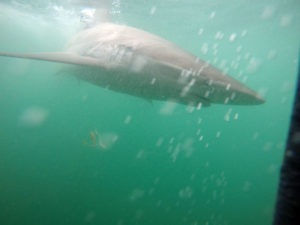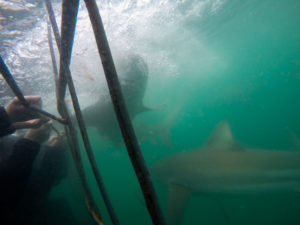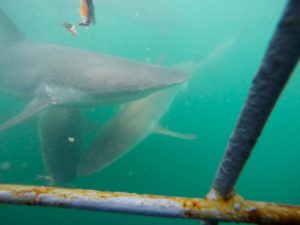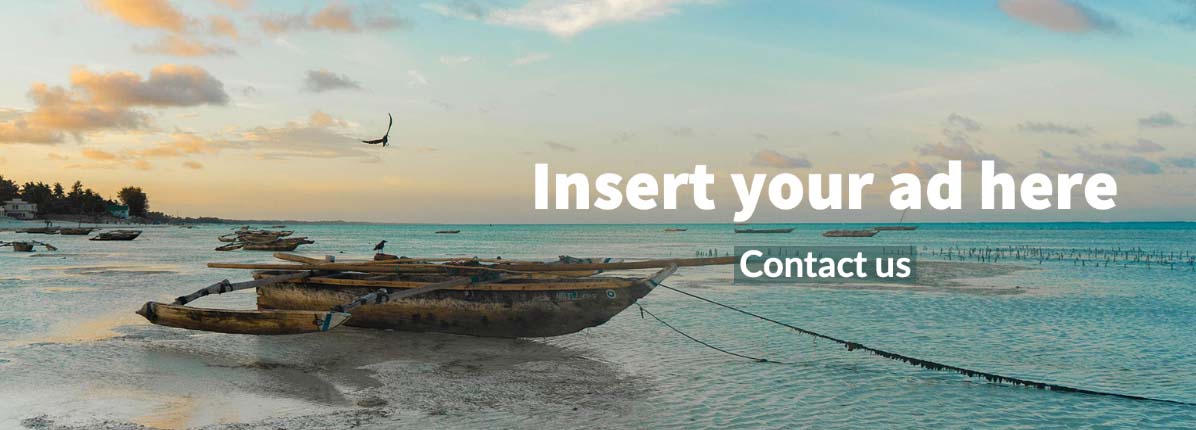Entering the world of white shark cage diving, we are exploring the pros and cons – while experiencing an encounter with these great wild animals.
Rare occasions
It’s windy while we enter the water. We leave Kleinbaai, Gans Bay (South Africa), shrouded in mystery and approach our destination after half an hour of sailing. High waves hit the boat as we anchor at Joubersdam. We are the only boat here, which is rare, considering the fact that Gans Bay as a result of being world’s ‘great white shark capital’ also has the highest number of cage diving operators. “It’s for the better,” says our captain. “More sharks for us.”
At that very moment, we are lucky to witness another rare occasion. As Mitch, our videographer, wants to brief us about the following steps, one of the seagulls drops his poo with military precision straight into Mitch’s open mouth. “O, shit!” He screams, while grabbing a bottle of water to rinse his mouth. “You’re lucky. That’s a first in four years!”
Surrounded by 3,5 meters long apex predators
It’s a good laugh, but not enough to forget about the idea that we’ll be surrounded by apex predators in a few minutes – only separated by a thin wire of steel. The tension rises as fast as the self-floating cage plunges into the water. We jump into our grey wetsuits and put on our dive masks, before we enter the cage. Despite the stormy weather, the water is a comfortable 16,5 degrees Celsius – 10 degrees warmer than usual around this time of the year.
The cage itself is less comfortable. It’s attached to the boat, which is heavily swinging as the waves hit it. We are gasping for air, while going up and down like being in a rollercoaster ride. “Down! Down! Down!” Shouts the crew when a dozen bronze whaler sharks pops up. The biggest one is a whopping 3,5 meters long. One by one they’re going for the bait, giving us a wildlife show we’ll never forget. The main act remains conspicuous by its absence, as we see no great whites at all.
Unfortunate for us, proving the point of Mary Rowlinson, Marine Biologist at White Shark Diving Company, who says that white sharks are not conditioned to be around. “Sometimes we have to wait hours for them,” she says. “Just for them to get attracted to the boat. Then they swim passed, look at the bait and go away. You can see that they’re just not really interested in what we do. Which is unfortunate, sometimes, because you obviously want to show them to people.”
Increased activity of white sharks
Well, that’s just the way things go in nature. Or, isn’t it? Recent research concluded that frequent interaction increases activity of the white sharks, with unknown long-term effects. Charlie Huveneers and his team tracked ten great whites at South Australia’s Neptune Islands for nine days. They found the increased movement when sharks are interacting with cage divers results in overall dynamic body acceleration 61% higher than at times when sharks are present in the area but cage divers are not.
A couple of months ago, the New Zealand court of appeal ruled that shark cage diving is illegal. A significant number of people from Stewart Island (NZ), who spent their days in or on the sea, claimed the white sharks’ behaviour changed dramatically after the cage diving began nine years ago. These divers, fishers and boat operators believe they are now being targeted by the sharks. Also, attacks on swimmers and surfers are said to be increased as a direct result of the cage diving industry.
Is cage diving ethical?
That raises questions. Is cage diving as ethical as it seems? Is our trip, indeed, conditioning the sharks to associate humans with food? If so, aren’t we as cage divers responsible for the shark attacks happening? Rowlinson dismisses all those concerns. She’s been studying the great white sharks at Gans Bay for almost three years now. “I don’t think that the sharks associate humans with food at all because of the cage diving industry,” she says. “I think that’s absolute rubbish.”
As mentioned, Gans Bay has the highest concentration of cage diving operators in the world. There are seven companies operating simultaneously at one site and some cage-diving operators are hosting up to three expeditions per day. If cage diving would cause shark attacks on swimmers, you’ll see a raise in the the number of attacks. “In summer, we have 20.000 people coming in,” says Mary. “They’re swimming in the ocean all the time. We’ve never had a shark attack in this area. Ever.”
Depleted food resources
“They are fishing heavily around Australia,” she continues. “The sharks food resources have been depleted, so the sharks have moved. It’s just unfortunate that they’ve moved into areas where swimmers are. Because sharks are opportunistic. The only way they can determine if something is their prey, is by taking a curiosity bite. It’s just unfortunate that that bite is often fatal to humans.”
Is cage diving conditioning sharks?
Mary also doesn’t believe that cage diving is conditioning the shark to associate humans with food. “You don’t feed white sharks,” she explains. “It’s the smell what is attracting them towards the boat. White sharks are half warm blooded species, so they burn energy to create heat. Even if they would get the bait, which are mostly tuna heads, that’s not enough calories for them to keep coming back over and over again. Its food value is simply too low.”
“Secondly, we do our actual best to make sure the whites do not get the bait. That’s not because of conditioning. That’s because their instinct is to dive down when they’re on to something and flash around. So potentially, they could get caught up in the rope and we obviously don’t want to hurt them.”
Eco tool for raising awareness
“Cage diving is an eco tool,” she continues. “In my opinion, even when you’re talking about aquariums and zoos, in the end of the day it would be better if we could just leave the animals alone. But even though white sharks are protected species since 1991, our population is decreasing. There are approximately 300 to 500 white sharks left, while the estimation was around 1200 to 1500 in 1996. So in terms of conservation, shark cage diving is very important. It allows people to see the animals and actually emotionally connect with them. White sharks are incredibly calm. They are very elegant and very beautiful in the water. I think cage diving is so important for raising that awareness.”
Find out why great white sharks are endangered. Or book your ticket:





Recent Comments